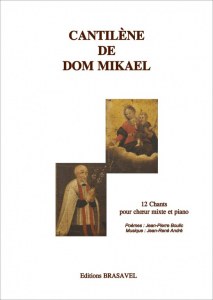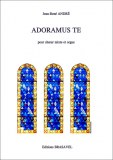Cantilena of Dom Mikael for mixed choir and piano JR André/JP Boulic
Reference BVL 32
I: The Breton people were waiting
II: A child of the coast
III: Troubled times and bad winds
IV: Thirst for freedom
V: The year of grace fifteen hundred and seventy-seven
VI: He wants the offered life
VII: To the silence of the hermitage
VIII : As long as one goes his way of man
IX : They say he is a mad priest
X: Always his heart gives itself
XI: All tenderness and true forgiveness
XII : On our land of hope
Poems : Jean-Pierre BOULIC - Music : Jean-René ANDRÉ
Jean-Pierre Boulic, lives in the Iroise region. His work has been distinguished in 2010 by the Grand Prix de poésie Louis Montalte of the Société des Gens de lettres and, in 2014, by the Yves Cosson Prize of poetry of the Literary Academy of Brittany and Pays de la Loire.
Jean-René André is a member of the teaching staff of the choral school of Saint Vincent - providence of Rennes and organist of the cathedral of Rennes.
The music of Dom Mikael's cantilena was commissioned by the association Mignoned Dom Mikêl. Its implementation is adapted to the vocal means of a mixed amateur choir (tessitura, intonations ...). It is composed of 12 songs with piano accompaniment. For some of them (according to the indications at the beginning of the score), the public could be invited to join the choir.
Encounters between the author of a libretto, a recognized music composer, an association (Mignoned Dom Mikêl) concerned with the development of a cultural and artistic heritage (it has recently promoted the restoration of the chapel Dom Michel), a Commune (Le Conquet) whose church houses the tomb of the Venerable Le Nobletz (the stained glass windows retrace his life), a Diocese (Quimper and Leon) which sees in Dom Michel a great witness of faith in Brittany. And for this reason, his beatification is hoped for. Finally, meetings of generous donors and volunteers.
It should simply be added that, according to the usual definitions, a cantilena is a profane song of an epic character. Here, the author of the poem was willing to see the life of his hero as an epic, narrating exceptional events that lead to the foundation of a new order of things.
Indeed, the way in which the priest Michel le Nobletz lived his human journey constituted, for the time, an upheaval of the modes of transmission of the Word and brings, again, at the beginning of the XXIst century, a deep subject of inspiration and research with regard to major questionings.










